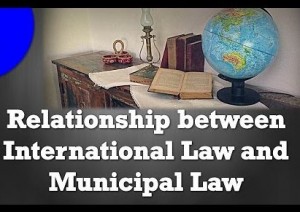In this blog post, Suhani Chanchlani of Amity Law School, Delhi simplifies the concepts of international law for newbies. Emphasis has also been laid on the difference between international law and municipal law and the sources of international law for better understanding.
What is International Law?
Simply put, it is the set of legal principles and rules that apply to the world in dealings of one state with other states and international organizations. For this reason, it is also known as the law of the nations.International Law, more often than not, is underpinned by consent. Each source of international law is it treaties or custom would only apply to a country that espouses its application to its affairs either through commission or omission of a particular act. It is divided into two kinds: Public International Law and Private International Law.
Public International Law primarily though not exclusively deals with the conduct of the sovereign states and international institutions in an international sphere. Whereas Private International Law is also known as Conflict of Laws, deals with cases that germinate within the legal framework of nation-states but involve the determination of aspects that affects more than one nation-states. Private International Law, thus, involves the application of foreign law, and disputing parties may sometimes approach foreign courts too.
Can International Law be termed as law?
The municipal law has an element of certainty, stability and predictability. Most of the civilized nations of the world have a determinate body that legislates laws. Such laws command authority over individuals within states. These are executed by governing authorities. Persons infringing laws are met with sanctions accorded by judicial authorities. In the case of international law, however, there are no such determinate bodies that can be said to be either legislature, executive or judiciary.
The General Assembly of United Nations, though performing the functions of a legislature cannot be said to be so as the resolutions passed by it are not binding on members.
Security Council, though vested with powers to enforce international laws, cannot be said to be the executive as it has failed to function at many crucial junctures on account of the veto powers of the permanent members. These members have, more often than not, exercised their veto powers for the furtherance of their national interests and rarely for the common good of the humanity. Thus, the Security Council has failed to take conclusive steps in many cases for the implementation of international law.
International Court of Justice too, cannot be deemed to be the principal judicial body for the adjudication of international law as its jurisdiction is limited to those cases where both the sides agree to approach the court.
Thus, it can be said that in the international sphere the legal order is not as cohesive as it is in nation-states. But does that mean that there is no international law as such? Certainly not. International law is the creation of states. In a world where states are connected more than ever before in the pursuance of the greatest good for the humankind, international law is the key to cooperation. It is in everyone`s interests to reach on common grounds with other statesto install satellites, exploit the resources of oceans, abate the deleterious onslaught of climate change or myriad of other activities to reach new commanding heights of progress. International law, in a way, is a reflection of rationality that in the common good of all, the welfare of each can be achieved. Thus, despite the absence of an element of force per se, states are more likely to be compliant with the law of the nations, as whatever they would do to others would be reciprocated by them in the equal or even higher measure.
What is the difference between international law and municipal law?
To understand International law, it is often compared and distinguished from the municipal laws of nations. However, it must be kept in mind that the basis of both of these systems of law is entirely different.
Firstly, the principal subject of international law is the nation-states. Whereas for the municipal law, it is the individuals.
Secondly, as is the case with the laws of most of the countries, the law is deemed to be above individuals. Whereas in international law, states themselves create law. Although the principle of supremacy of law is well recognized, the states often obey or disobey laws or create laws by their interests.
Thirdly, there is a vast difference when it comes to sources of law.
As for Public International Law, Article 38 of the Statute of the ICJ (from now on Article 38) is considered to be the most authoritative statement of the sources of law. These are law creating sources such as treaties and conventions, international customs with evidence of state practice, general principles of law recognized by civilized nations and subsidiary means for determination of law such as judicial decisions and teachings of highly qualified publicists. It is arguable whether the order of sources of law as given in Article 38 reflects hierarchy or not.
Whereas in the case of municipal laws in countries where a stable legal order is established, there is a determinable hierarchy of laws with one type of legal commandment being of more authoritative value than others. For instance, in common law countries, there is a hierarchy of courts wherein the judgments of higher courts are of more authoritative value than that of lower courts.
On the other hand, most of the publicists of international law are of the opinion that there is no such hierarchy of sources of law for the law of the nations. However, as is outlined in Article 38, treaties and customs are of relatively higher value than the judicial decisions or teachings of highly qualified publicists as the latter have been termed as subsidiary means of determination of law.
What are the sources of international law?
For the public international law, as mentioned before, sources of law are treaties, custom, general principles of law recognized by civilized nations, judicial decisions and teachings of highly qualified publicists.
Treaties
Treaties are based on a customary law principle pacta sunt servanda, which means promises must be kept. It is similar to a contract as countries create their set of rights and obligations out of their volition. Thus, a treaty can be said to be a written agreement between two or more states which lays down the manner in which every state would act in its dealings with other participating states. Terms such as conventions, charters, declarations, and statutes are often used in place of the term treaties. However, there is a slight difference in meaning of these terminologies.
Treaties are of three kinds:
Bilateral treaties: It is in a written agreement between two states. Example: Free Trade Agreement between two states.
Multilateral treaties: It is also known as the law creating treaties in which a large number of nations participate to create laws of general application. Example: Vienna Convention on the Law of the Treaties (VCLT).
Plurilateral treaties: A limited number of states enter into a written agreement on account of their special interest in the subject matter of the treaty.
The term ‘conventions’, although used synonymously with the term treaties is of relatively lesser scope as it only relates to multi-lateral treaties.
‘Charter’ is often used to mean a document that establishes basic norms of international legal institutions and bodies.
‘Declaration’ is of relatively non-binding nature than treaties and charters. It is an expression of the acceptance or willingness to accept a principle of law by a large number of state. It reflects the position of the international community on certain issues that are global in nature.
Treaties are not binding on those who do not sign and ratify it. However, if a treaty reflects a rule of customary international law, then that rule would be binding on even non-parties not because it a rule laid down in a treaty but because a treaty reaffirms the existence of a rule of customary international law.
Custom
Custom is considered to be one of the primary sources of international law. It is of particular importance in international law because of its decentralized nature. There are two essentials for an act of a state to constitute as custom:
The first being the state practice itself. It is unimaginable to conceive of a formulation of custom without anything done on the part of a state. The act of a state does not necessarily need to be positive in nature. The passive conduct of a state would also constitute state practice. For instance, the acquiescence of a state to the conduct of another state by its failure to protest. State practice must be extensive, consistent and uniform and prevail for at least such a period as would establish it as an accepted and recognized act of states.
The second essential is opinio juris, that is, the psychological belief of a state that its act is creating a legally obligatory position for itself. States today perform myriad kinds of activities. Not every activity of a state would necessarily create binding rules of customary law. Thus, a state`s act would be binding upon itself if it is done in its legal capacity in an international sphere. For instance, if a state is voting in a particular pattern on a particular issue in General Assembly, it is reflective of its opnio juris.
General Principles of Law
As already enunciated before, international law is relatively undeveloped than the municipal law given that there is no cohesive body for legislating laws or a court that have the power to set precedents. Even in the presence of such bodies (though not as authoritative as they are in states), they have not legislated enough laws or administered enough cases so as to determine every point of dispute that may arise in the international sphere. For such a scenario, Article 38 provides for ‘general principles of law recognized by civilized nations’ as a source of law. This term implies that for adjudication of a dispute, the judge would employ legal principles that underpin international law and or legal systems of civilized nations.
For instance, in the Chorzow Factory Case[1], the Permanent Court of Justice recognized the general principle of international law that upon the breach of an international obligation, it is the duty of a state to make reparations.
International law heavily employs analogies from the municipal law especially for determining the procedure, evidence or judicial process. In the Corfu Channel Case[2], the ICJ while referring to circumstantial evidence, pointed outthat ‘this indirect evidence is admitted in all systems of law, and its useis recognized by international decisions’. The principle of res judicata too, which means that the decisionin the circumstances is final, binding and without appeal, was recognized to be part of international law through various judicial decisions.
Judicial Decisions
Although in the words of Article 38, judicial decisions are only subsidiary means of determination of law. Article 59 of the Statute of the ICJ too declares that the decisions of the Court have no binding value on the Court except between those parties who bring their case to the Court. Despite this position, the Court follows its judgements of previous cases to maintain a certain level of certainty. Thus, in international law the doctrine of stare decisis as followed in common law countries is not present. Still the previous judgments of the Court are accorded some value and in some cases are even deemed to be authoritative.
Writings of the Publicists
As per Article 38, teachings of the highly qualified publicists of international law are to be considered as the subsidiary means of determination of law. Despite being mentioned under the head of ‘subsidiary means,’ the impact of publicists in the development of international law has been profound. For instance, the works of Oppenheim, Rousseau, Grotius and Gidel has been formative in the development of international law. The role of the writers is especially significant in providing coherence and structure in as diverse a field of inquiry as the international law.
Footnotes:
[1]PCIJ, Series A, No. 17, 1928, p. 29; 4 AD, p. 258.
[2]ICJ Reports, 1949, pp. 4, 18; 16 AD, pp. 155, 157.
 Serato DJ Crack 2025Serato DJ PRO Crack
Serato DJ Crack 2025Serato DJ PRO Crack














 Allow notifications
Allow notifications


